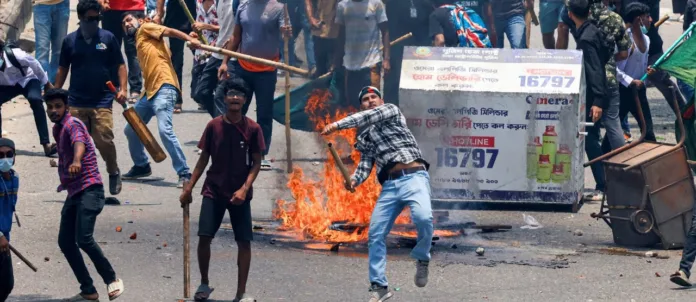Nationwide unrest over government job quotas prompts military intervention and curfew, with over 100 casualties reported
In Dhaka, Bangladesh, soldiers now patrol the empty streets as the nation grapples with severe student-led protests against government job quotas. The government has imposed a curfew and deployed the military in response to violent clashes that have claimed more than 100 lives this week. On July 20, 2024, Prime Minister Sheikh Hasina took the drastic step to curb the escalating violence, cancelling foreign visits to address the crisis at home.
The unrest, which began as a protest against new job quotas reserving 30% of government positions for the families of those who fought for Bangladesh’s independence from Pakistan, has quickly spiralled out of control. This measure has reignited old political tensions between independence fighters and those accused of collaborating with Pakistan during the 1971 war. The violence reached a peak with students clashing fiercely with police, leading to a significant death toll and thousands of injuries.
The streets of Dhaka and other major cities have seen intense confrontations, with police using tear gas and sound grenades to disperse crowds, while protesters responded by hurling bricks and setting vehicles on fire. On July 19, the aftermath of the most violent day yet revealed torched government buildings and a nationwide internet blackout aimed at stifling the coordination of protests.
With police forces struggling to contain the situation, the government imposed a curfew and brought in military forces. The curfew will be temporarily lifted for two hours on July 20 at noon, allowing residents to procure essential supplies before resuming until 10 a.m. on July 21, when the government will reassess the situation.
This movement, the largest since Hasina’s re-election for a fourth consecutive term, is also fueled by high youth unemployment. Young people, who constitute nearly a fifth of the 170 million population, are expressing their frustration with limited job opportunities and economic prospects.
International organizations and human rights groups have condemned the government’s actions, particularly the internet shutdown and the use of excessive force by security personnel. The European Union has voiced deep concern over the escalating violence and the loss of lives, urging the Bangladeshi government to exercise restraint and engage in dialogue with the protesters.
Analysis:
Political Perspective:
The political ramifications of the student-led protests in Bangladesh are profound. Prime Minister Sheikh Hasina’s government faces immense pressure to address the grievances of the youth and manage the political fallout from the unrest. The job quota system, designed to honour families of independence fighters, has instead highlighted deep-seated political divisions. Hasina’s cancellation of foreign visits underscores the severity of the crisis, signalling a government on the defensive. This unrest could influence future elections and reshape the political landscape, potentially undermining the government’s legitimacy and prompting calls for political reforms.
Social Perspective:
Socially, the protests reflect broader issues of social justice and equity in Bangladesh. The government’s quota system, although well-intentioned, has been perceived as unjust by a significant portion of the population, particularly the youth. The violent clashes and heavy-handed response from the authorities have further polarized society, creating a rift between the government and its citizens. The deployment of the military and the imposition of curfews have disrupted daily life, affecting not just the protesters but also ordinary citizens who find themselves caught in the crossfire.
Racial Perspective:
While the protests are primarily focused on job quotas and political issues, they also touch on underlying ethnic and racial tensions. The division between those who fought for independence and those accused of collaborating with Pakistan has historical and ethnic undertones. This divide has been exacerbated by the government’s policies, leading to a resurgence of old animosities. The protests, therefore, are not just about job quotas but also about a broader struggle for recognition and justice among different ethnic groups in Bangladesh.
Gender Perspective:
Gender dynamics play a critical role in the unfolding crisis. Women, particularly young women, have been active participants in the protests, highlighting issues of gender inequality in addition to the general demands for job opportunities. The government’s response, including internet shutdowns and curfews, has had a disproportionate impact on women, who may face additional barriers to accessing information and resources. The protests have brought attention to the need for more inclusive policies that address the specific challenges faced by women in the workforce.
Economic Perspective:
Economically, the protests are a reaction to the high unemployment rate among Bangladesh’s youth. The lack of job opportunities has created widespread discontent, with the government’s job quota system seen as an inadequate solution. The unrest has disrupted economic activities, with businesses forced to close and trade affected by the curfews and internet shutdowns. The long-term economic impact could be significant, deterring foreign investment and slowing down economic growth. The government will need to implement robust economic policies to address unemployment and restore confidence among both local and international stakeholders.
Overall, the student-led protests in Bangladesh represent a multifaceted crisis with deep political, social, racial, gender, and economic implications. The government’s response, including military deployment and curfews, highlights the severity of the situation and the challenges ahead. Moving forward, a balanced approach that addresses the protesters’ demands while ensuring stability will be crucial for the future of Bangladesh.
